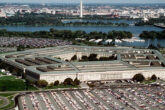April 23, 2023
Why Security Assistance Often Fails
The 20th anniversary of the U.S. invasion of Iraq has launched a set of reflections and recriminations over the decision to invade and subsequent bungling of the occupation. But another frustration with U.S. policy in Iraq deserves attention, as it has profound implications for U.S. policy today: the United States’ failure to build the Iraqi military. Building a competent Iraqi military was a pillar of the U.S. strategy to establish and maintain security in Iraq, which would enable U.S. forces to exit what was an increasingly unpopular war.
The United States builds better militaries when partner leaders implement the vital policy reforms the United States recommends, and U.S. security assistance fails when U.S. influence fails.
Despite the centrality of the security assistance effort to U.S. foreign policy—the billions of dollars, eight years, and tens of thousands of personnel dedicated to the task—the Iraqi military never developed basic battlefield proficiency, and in the summer of 2014, less than three years after the U.S. withdrawal, the Iraqi Army’s 2nd Division melted away in the face of small numbers of lightly armed Islamic State fighters.
Read the full story and more from Lawfare.
More from CNAS
-
Why China’s Amphibious ‘Invasion Platforms’ Are Troubling Sign for Taiwan
Beijing’s new ships can land on beaches and link to form massive mobile piers. Analysts, including Tom Shugart from Center for a New American Security, say they’re intended to...
By Tom Shugart
-
"From Production Lines to Front Lines," with Becca Wasser and Philip Sheers of CNAS
In this episode of Building the Base, Hondo Geurts and Lauren Bedula are joined by Becca Wasser and Philip Sheers from the Center for New American Security (CNAS) to discuss t...
By Becca Wasser & Philip Sheers
-
Lessons in Learning
Executive Summary Although claims of a revolution in military affairs may be overhyped, the potential for artificial intelligence (AI) and autonomy to change warfare is growin...
By Josh Wallin
-
The Pentagon Push to Change an “Antiquated” System
Carlton Haelig, a fellow at the Center for a New American Security, joined The Cipher Brief to discuss the systems in place in the Department of Defense and the challenges ass...
By Carlton Haelig




